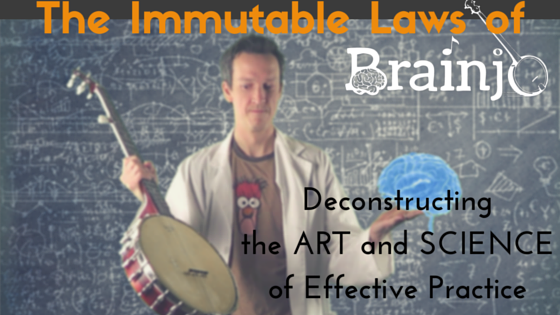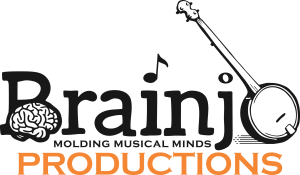
Episode 25: The Advantages of an Adult Brain
“I’m in my 60s and i have never played instrument. Can I still learn to play the banjo?”
This question, or some variation of it, is one I receive quite often. Buried inside it are a whole range of assumptions. Assumptions about childhood, about inborn talents and abilities, and about the ability of older brains to learn new things.
Hopefully, those of you who’ve read this series will know that the immediate answer to that question is: Absolutely!
We all possess a brain capable of changing itself throughout our life. And since changing the brain is the biological foundation of all learning, we can learn to play any new skill, including playing an instrument, whether we’re 8 or 80.
Be that as it may, there are some who may still believe that starting out “later in life” is a disadvantage.
But I’d argue just the opposite.
I’d argue that, while there may be certain advantages to learning during childhood, the scales tilt in favor of the older brain. Here’s why:
[RELATED: The Breakthrough Banjo courses for fingerstyle and clawhammer were specifically designed to maximize the learning potential of the adult brain. Click on the link to the style you’re interested in to learn more the courses.]
4 Advantages of Having An Adult Brain
Adult Advantage #1: FOCUS
Focused, undivided attention is essential to learning. It would be wasteful for us to remember everything in the course of our daily life, and it’s only when we pay close attention to something that our brain tags it for further encoding and storage while we sleep.
Attention, then, is the gatekeeper of neuroplasticity. In other words, sustained, single minded focus is required for our brain to change itself in response to practice.
When we play close attention to something, widely connected neurons towards the base of the frontal lobe bathe their targets in the neurotransmitter Acetylcholine. It’s the chemical cue that says “this is important.”
In childhood, those circuits mediating attention and concentration haven’t fully matured. Anyone who’s spent time around a 9 year old boy can attest that sustaining focus isn’t typically his strong suit. And these circuits don’t fully mature until we’re in our early 20s.
Adult Advantage #2: DELIBERATE PRACTICE
As covered in Episode 1, how we practice matters far more than how much we practice. Those outliers who reach mastery several times faster don’t do so by dint of DNA, but because they practice strategically.
They focus relentlessly on areas of weakness until they become areas of strength. And they don’t waste time practicing what they’ve already learned well. This process is sometimes referred to as “deliberate practice.”
Deliberate practice not only requires careful planning, but an honest appraisal of one’s abilities – and honest self assessment is also something that improves with age. As the years and life’s hard knocks accumulate, ego declines, and humility rises. Our finely honed inner critic can be an asset, provided we put it to good use.
Adult Advantage #3: Motivation.
Let’s face it, most kids taking music lessons don’t actually want to be there. I imagine we could end world hunger if we could get recover all the money wasted on piano, guitar, and violin instruction during childhood.
Learning can’t be forced. It just isn’t going to happen without the desire to learn. You can’t manufacture intrinsic motivation.
But this isn’t a problem for the adult learner. If you’ve decided to tackle the 5-string later in life, you’re doing so because it’s something you really want.
Those childhood “prodigies” that show up in your Facebook feed playing Foggy Mountain Banjo at blistering speed capture our attention precisely because they are extraordinary. They’re the exceptions that prove the rule.
Adult Advantage #4: TIME.
I’m specifically talking about those of you who’ve decided to take the banjo plunge in your golden years, after you’ve shed many of the responsibilities of work and family and are now free to pursue passions you’ve kept on the back burner.
You have the time to not only practice, but to do all those other things that feed your banjo-learning brain, like listening to copious amounts of great music, studying those banjoists you love most, and getting out and playing music with your peers.
Stealing From Children
Now, don’t get me wrong. The deck isn’t stacked entirely in the favor of those with a well aged noodle. Things do slow down a bit inside the brain as we get older.
Thanks to things like advanced glycation end products and oxidative damage, the speed of a typical human’s nerve impulses decline by roughly a tenth of a second every 10 years. That’s not huge, but it’s enough to matter.
Even that decline is not an inevitable product of aging, however, and something that can likely be modified through diet and lifestyle (the precise details of which are beyond the scope of this discussion). Furthermore, the magnitude of slowing also isn’t enough to matter when it comes to the demands of music making.
I saw Doc Watson playing live well into his 80s. Even though I imagine he could’ve played at a faster clip 50 years prior, not once did I think to myself “sounds great, if only it were faster.”
Sure, losing those lightning fast neuronal transmission speeds of youth means you probably won’t be setting the world record for speed picking in your 60s, but it’s a happy coincidence that, by the time you’ve reached that age, you’ve long ago stopped caring about such things.
The other area where the kids have the advantage, and where we bigger folks should take note, is that kids aren’t afraid of screwing up. As covered in Episode 4, failure is essential to the learning process. In fact, it’s in the analyzing, understanding, and correcting of our mistakes where we improve.
And the single biggest obstacle the adult learner faces is in overcoming the concern about screwing up. Kids, who tend to show up without any preconceived expectations or insecurities, don’t typically grapple with these issues.
“Whether you think you can or you think you can’t, you’re right”
– Henry Ford
Never Too Late
It literally is never to late to start. And hopefully I’ve convinced you that, beyond that, starting late gives you a distinct set of advantages.
And besides being loads of fun, learning to play the banjo has other benefits, too. You’ve probably noticed the explosion of “brain building” games and apps in recent years, a response to research showing the health benefits of exercising one’s brain.
But, as someone who’s spent his professional life caring for those with brain disease, when it comes to counteracting the forces of aging, or fortifying yourself against degenerative brain disease, you can’t do any better than learning to play a musical instrument.
If you really want to grow your brain, put down the crossword puzzle, or the Lumosity app, and pick up the banjo instead.
To learn more about the Breakthrough Banjo courses for clawhammer and fingerstyle banjo, click the relevant link below:
— Breakthrough Banjo for CLAWHAMMER Banjo —
— Breakthrough Banjo for FINGERSTYLE Banjo —
— The Laws of Brainjo Table of Contents —
View the Brainjo Course Catalog
